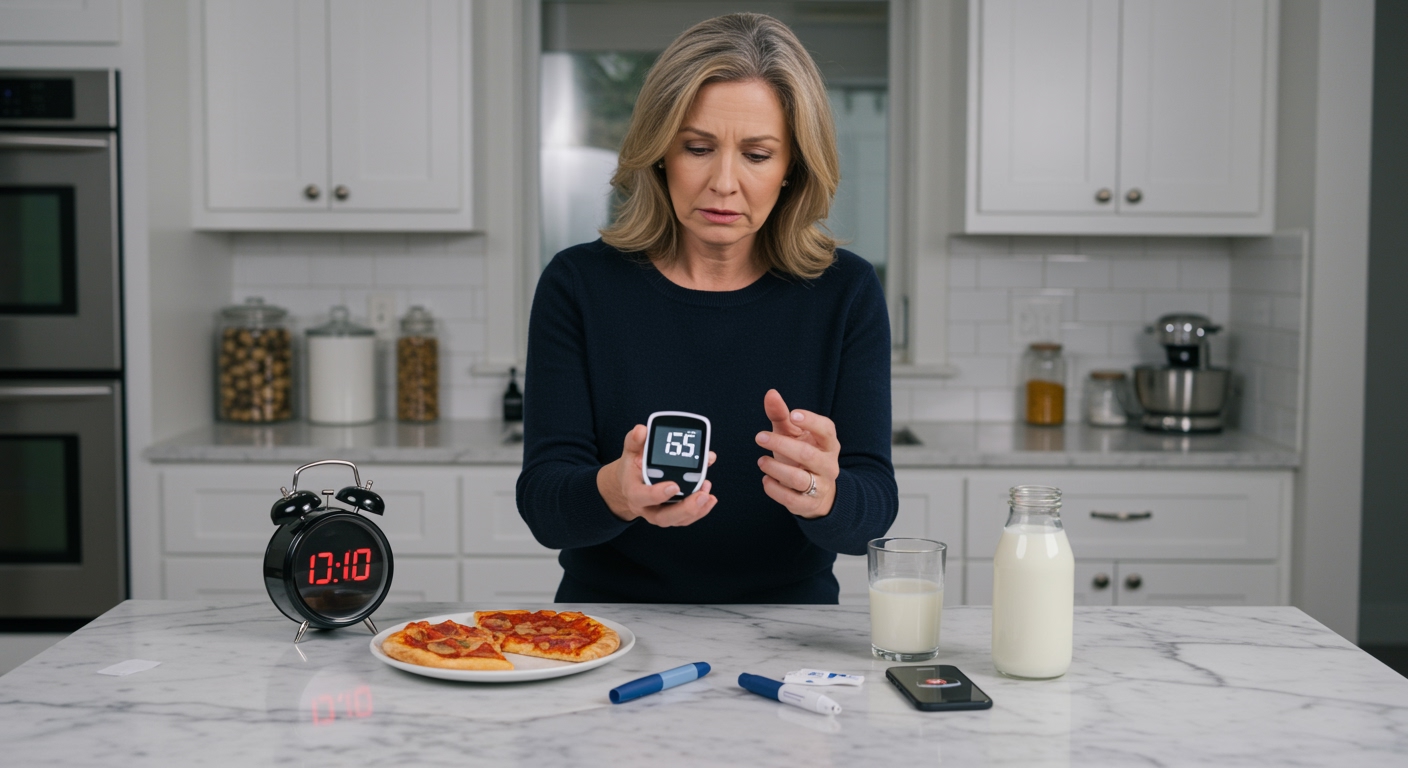✪ Key Takeaway: Eating after 8 PM disrupts your natural insulin response and increases diabetes risk by up to 20%.
Introduction
You grab a slice of leftover pizza at 10 PM and think nothing of it.
Your body thinks differently and starts a dangerous chain reaction that spikes your blood sugar to levels that would shock you.
Hi, I’m Abdur, your nutrition coach and today I’m going to explain how your late night eating habit triggers dangerous blood sugar spikes that increase your diabetes risk.
Why Does Your Body React Differently At Night?
Your body operates on a circadian rhythm that controls when hormones are released throughout the day.
During evening hours, your insulin sensitivity naturally decreases as your body prepares for sleep.
This means the same meal that causes a normal blood sugar response at lunch will create a much higher spike at night.
Your pancreas struggles to produce enough insulin to handle the glucose load when your natural insulin sensitivity is at its lowest point.
Research shows that glucose tolerance can be 17% worse in the evening compared to morning hours.
Your liver also becomes less efficient at storing excess glucose as glycogen during nighttime hours.
✪ Fact: Your insulin sensitivity drops by 25% between 6 PM and midnight compared to morning levels.
What Happens Inside Your Body After 8 PM?
When you eat after 8 PM, your body enters a state of metabolic confusion.
Your digestive system slows down significantly as it prepares for the overnight fasting period.
The food you consume sits in your stomach longer, causing delayed gastric emptying that leads to prolonged blood sugar elevation.
Your cortisol levels begin to rise in preparation for the next day, which further reduces insulin sensitivity.
Meanwhile, your body starts producing melatonin, a hormone that directly interferes with insulin production and glucose metabolism.
This creates a perfect storm where your blood sugar remains elevated for hours longer than it would during daytime eating.
Studies show that late-night meals can keep blood glucose levels elevated for up to 3 hours longer than the same meal eaten earlier in the day.
✪ Pro Tip: Stop eating at least 3 hours before bedtime to allow your blood sugar to normalize before sleep.
How Much Does Late Eating Increase Your Diabetes Risk?
Northwestern University research reveals that people who eat after 8 PM have a 20% higher risk of developing type 2 diabetes.
This increased risk comes from the chronic elevation of blood glucose levels that occurs with regular late-night eating.
Your beta cells in the pancreas become overworked from constantly producing extra insulin during low-sensitivity hours.
Over time, these cells become damaged and lose their ability to produce adequate insulin, leading to insulin resistance.
Late-night eaters also show higher levels of hemoglobin A1C, a marker that indicates average blood sugar levels over the past 3 months.
The combination of reduced insulin sensitivity and prolonged glucose elevation creates a dangerous cycle that accelerates the development of metabolic dysfunction.
Even healthy individuals who eat late regularly show early signs of glucose intolerance within just 2 weeks of changing their eating schedule.
✪ Note: Even one late meal per week can negatively impact your glucose tolerance for up to 48 hours.
Which Foods Cause The Biggest Problems At Night?
Refined carbohydrates and sugary foods create the most dramatic blood sugar spikes when eaten after 8 PM.
Foods like white bread, pasta, cookies, and ice cream cause rapid glucose absorption that overwhelms your already-reduced insulin sensitivity.
High-fat meals also pose problems because they slow digestion even further, keeping blood sugar elevated for extended periods.
Processed foods with added sugars and artificial ingredients create the worst combination of rapid glucose spikes and prolonged elevation.
Even seemingly healthy foods like fruit can cause problems when eaten late because fructose metabolism is less efficient during evening hours.
Large portion sizes compound these effects by providing more glucose than your compromised insulin system can handle effectively.
Research shows that the same 50-gram carbohydrate load causes 40% higher blood sugar peaks when consumed at 10 PM versus 10 AM.
✪ Pro Tip: If you must eat late, choose protein-rich foods with minimal carbohydrates to minimize blood sugar impact.
How Can You Protect Your Blood Sugar At Night?
The most effective strategy is to establish a eating cutoff time of 7 PM and stick to it consistently.
If you must eat later due to work schedules, choose foods that have minimal impact on blood glucose levels.
Protein sources like Greek yogurt, cottage cheese, or a small portion of lean meat provide satiety without major glucose spikes.
Taking a 10-minute walk after any late meal can help your muscles absorb excess glucose and reduce blood sugar elevation.
Monitor your blood sugar with a glucose meter if you regularly eat late to understand how different foods affect your individual response.
Stay hydrated with water rather than sugary drinks, as dehydration worsens insulin resistance during nighttime hours.
Consider intermittent fasting approaches that naturally limit your eating window to earlier in the day when your insulin sensitivity is highest.
The Bottom Line
Late night eating after 8 PM disrupts your natural insulin response and significantly increases your risk of developing type 2 diabetes.
Your body clock determines your blood sugar response more than you realize.
I would love to hear about your experiences with late night eating and any questions you might have about managing your blood sugar levels in the comments below.
References
At NutritionCrown, we use quality and credible sources to ensure our content is accurate and trustworthy. Below are the sources referenced in creating this article:
- EMJ Reviews: Dangers of Late-Night Eating: Risks to Glucose Tolerance and Overall Health
- PMC: Meal timing and frequency: implications for cardiovascular disease prevention
- Northwestern University: Why late-night eating leads to weight gain, diabetes
- Johns Hopkins Medicine: Research Story Tip: Eating a Late Meal May Be Harmful to Your Metabolic Health

